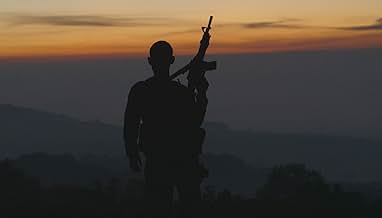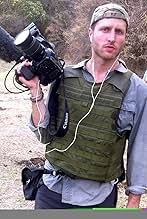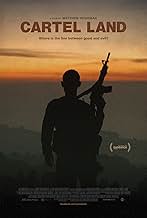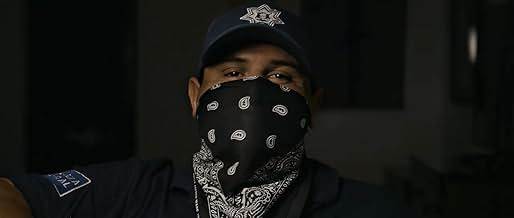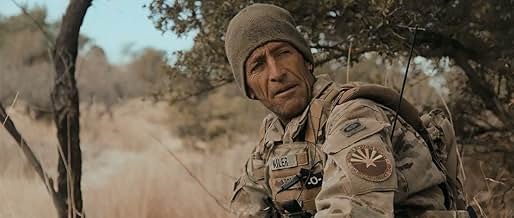Filmmaker Matthew Heineman examines the state of the ongoing drug problem along the U.S.-Mexican border.Filmmaker Matthew Heineman examines the state of the ongoing drug problem along the U.S.-Mexican border.Filmmaker Matthew Heineman examines the state of the ongoing drug problem along the U.S.-Mexican border.
- Nominated for 1 Oscar
- 19 wins & 38 nominations total
Nicolás Sierra
- Self
- (as as Nicolás Sierra 'El Gordo')
Alfredo Castillo Cervantes
- Self - Mexican political
- (as Alfredo Castillo)
María Imilse Arrué
- Self
- (as María Imilse)
Featured reviews
Greetings again from the darkness - from the Dallas International Film Festival. Even in this digital age where information exists from all sides of a conflict
often with corresponding video, the general public somehow remains complacent to issues that don't directly and obviously affect their lifestyle. Skilled documentarian Matthew Heineman ignores the rhetoric of political speeches and plops the war against drug cartels right into our lap.
This is a different approach to a topic with which we are all at least somewhat familiar. The involved parties include the affected communities (in Mexico and Arizona), the governments and affiliated agencies (DEA, Border Patrol), the ever-expanding vigilante groups of citizens (Arizona Border Recon, AutoDefensas), and of course the cartels (focus on Knights Templar).
Intimacy is the key here, as Mr. Heineman takes us inside these groups with an up-close look at leaders. Especially fascinating is Dr. Mireles who is the face of the AutoDefensas – a group he pledges will protect communities from the cartels, who clearly have no regard for human life. The film doesn't shy away from the expected issues: citizen pushback, greed, abuse of power, and corruption. As AutoDefensas teams with the Mexican government to create the Rural Defense Force, we can't help but wonder if the rumors of differing goals are at play in the drug battles. Citizens want safety, but what is it that the government wants? Is the goal drug-free streets or is it a cut of the action.
Learning how desperate the vigilantes are to protect their homes, turf and way of life, we are left with little doubt of their mission. It's everyone else that we must keep questioning and holding accountable. This is not an easy documentary to watch, but it's necessary if you have previously lost interest as the next politician proclaims he will continue "the war on drugs".
This is a different approach to a topic with which we are all at least somewhat familiar. The involved parties include the affected communities (in Mexico and Arizona), the governments and affiliated agencies (DEA, Border Patrol), the ever-expanding vigilante groups of citizens (Arizona Border Recon, AutoDefensas), and of course the cartels (focus on Knights Templar).
Intimacy is the key here, as Mr. Heineman takes us inside these groups with an up-close look at leaders. Especially fascinating is Dr. Mireles who is the face of the AutoDefensas – a group he pledges will protect communities from the cartels, who clearly have no regard for human life. The film doesn't shy away from the expected issues: citizen pushback, greed, abuse of power, and corruption. As AutoDefensas teams with the Mexican government to create the Rural Defense Force, we can't help but wonder if the rumors of differing goals are at play in the drug battles. Citizens want safety, but what is it that the government wants? Is the goal drug-free streets or is it a cut of the action.
Learning how desperate the vigilantes are to protect their homes, turf and way of life, we are left with little doubt of their mission. It's everyone else that we must keep questioning and holding accountable. This is not an easy documentary to watch, but it's necessary if you have previously lost interest as the next politician proclaims he will continue "the war on drugs".
Although he hasn't made the technical "best" documentary of the year), it's hard to see a documentary filmmaker who stuck his neck out more, literally, than Matthew Heienman to make Cartel Land (maybe Joshua Oppenheimer, in his way, put himself in danger to make his Indonesia docs, but he wasn't caught up in anything like this). He puts himself into some incredibly dangerous scenes, and from what I could tell it's not at all the case of him trying to get some extra dramatics or tension where there is none. On the contrary he follows the Mexican group the Autodefensas (at times when they are in the midst of shoot-outs and enemy fire) in their rise to become a major presence in Michoacan, Mexico, as well as how they became corrupted by the very forces they are/were up against.
So points automatically have to go to the director for that, and he clearly is passionate about this issue - and as the wisest choice he doesn't put himself into it in the slightest (very much the objective, here and there more like a war cine-journalist when with his camera on the streets and roads and interrogation rooms). But I do wish that he had stuck to the story of the Doctor Meirelles and his group, as he and the world that he's in is just more captivating and stronger as a story of a rise and fall than that of the American who is supposed to be the 'counter-point' or other side example.
His story, as a man who has split off from society (in part due to the 2008 economic collapse, among other issues), and formed a small would be (?) militia patrolling parts of the Mexican border for immigrants, could be compelling. But it's not even so much that the contrast or point-counter-point of him and the Doctor might not have some interest (I think the point ultimately is one guy really is fighting for his life and for others, and the other is more about rounding up illegal immigrants where, for some reason, border patrol doesn't seem to be around), it's more a flaw of filmmaking. I think that if Heineman had kept it all down as a story of the Autodefensas, he would have a full movie to tell, and indeed the two places - on the US/Mexico border and Michoacan, which is over a thousand miles away to the south - are so far apart that they don't have much relation to one another exactly. Of course the cartels are a problem in one spot as much as the other, yet on a simple film editing level, it throws off the balance.
This could have been two documentaries, perhaps, again to bring up Oppenheimer, as compliments to one another. It's a shame that it doesn't work much better, since there's a lot of potent, incendiary stuff here. When Cartel Land works best, it all but indicts a country for not doing far more than it should, or what the president or government claims to do (again, this is the documentary, I'd have to read up more to know if the filmmaker doesn't show more sides to what the police or other military forces may or may be doing for the Autodefensas to rise up in the first place), and that corruption and crime becomes just a fact of life. It displays another form of terrorism that seems not as apparent as, say, Islamic fundamentalism but is no less a threat to the people where it takes place, though oddly enough what the film shows is the danger of vigilantism as well.
So points automatically have to go to the director for that, and he clearly is passionate about this issue - and as the wisest choice he doesn't put himself into it in the slightest (very much the objective, here and there more like a war cine-journalist when with his camera on the streets and roads and interrogation rooms). But I do wish that he had stuck to the story of the Doctor Meirelles and his group, as he and the world that he's in is just more captivating and stronger as a story of a rise and fall than that of the American who is supposed to be the 'counter-point' or other side example.
His story, as a man who has split off from society (in part due to the 2008 economic collapse, among other issues), and formed a small would be (?) militia patrolling parts of the Mexican border for immigrants, could be compelling. But it's not even so much that the contrast or point-counter-point of him and the Doctor might not have some interest (I think the point ultimately is one guy really is fighting for his life and for others, and the other is more about rounding up illegal immigrants where, for some reason, border patrol doesn't seem to be around), it's more a flaw of filmmaking. I think that if Heineman had kept it all down as a story of the Autodefensas, he would have a full movie to tell, and indeed the two places - on the US/Mexico border and Michoacan, which is over a thousand miles away to the south - are so far apart that they don't have much relation to one another exactly. Of course the cartels are a problem in one spot as much as the other, yet on a simple film editing level, it throws off the balance.
This could have been two documentaries, perhaps, again to bring up Oppenheimer, as compliments to one another. It's a shame that it doesn't work much better, since there's a lot of potent, incendiary stuff here. When Cartel Land works best, it all but indicts a country for not doing far more than it should, or what the president or government claims to do (again, this is the documentary, I'd have to read up more to know if the filmmaker doesn't show more sides to what the police or other military forces may or may be doing for the Autodefensas to rise up in the first place), and that corruption and crime becomes just a fact of life. It displays another form of terrorism that seems not as apparent as, say, Islamic fundamentalism but is no less a threat to the people where it takes place, though oddly enough what the film shows is the danger of vigilantism as well.
Review: What a brilliant documentary! It really did seem like it was a feature film because it's full of action and intense drama. The director, Matthew Heineman, was lucky to gain the trust of Dr. José Mireles and Tim "Nailer" Foley, to go behind the scenes and film the gruesome problems in the Mexican state of Michoacan and the Arizona border, which is used by the drug cartels to bring drugs into America. Both stories involve heavy corruption, kidnap, horrifying murder, rape and black mail. Matthew put together enough material to tell the terrifying story about the drug cartels who will kill anybody who step in there way. Tim is an ex veteran who suffered abuse from his father and left home at the early age of 15. After working in various jobs and losing his house due to the credit crunch, he started to work alongside immigrants, who worked illegally and didn't pay any taxes. He then decided to use his savings to put together an elite force called the Arizona Border Recon in Arizona's Altar Valley, to stop the drug cartels from bringing there drugs into America and to stop the war causing any problems across the border. His small force use heavy artillery and patrol during day and night to protect his home and infiltrate the cartels various methods of trafficking drugs. As there isn't any laws to protect them, they basically take matters into there own hands and risk there life's for there country and to make sure that things don't get out of hand. While Tim is battling against the cartels, who are using the newest technology to communicate, Dr. José Mireles is also battling against the cartels but his war is to protect Michoacan and to gain control of the various towns which have many violent gang members, called the Knight Templars, who are causing havoc in there communities. After giving speeches in the various towns, he manages to put together a force called the Autodefensas, who use heavy artillery and group together in numbers to get the perpetrators out of the many villages. He successfully cleans up many of the small towns and he becomes highly respected around Michoacan. He then ends up in a plane crash, which paralysed a side of his face and seriously damages his back, so he takes time out from the Autodefensas and goes into hiding because he doesn't know if the crash was a hit from the cartels. On the anniversary of the Autodefensas, José comes out of hiding and takes back control of his elite force but everything has got out of control and a lot of the Autodefensas are using there powers to do bad things. As they haven't got the right to have guns and apply force around Michoacan, the government step in and build there own force, which pushes José out of control. All of his fellow workers join the government force because they are allowed to use guns by law and Jose's life becomes in danger because he has broken so many laws when he was in control. When they eventually catch up with José, they put him in a Federal Centre for Social Re-adaptation in Hermosillo, Sonora. Although he still gains support from the villagers, he has basically become a political prisoner who is kept behind bars to silence him and take full control of his elite force. It has all the makings for a brilliant film but as this is a documentary about true events, I found it thrilling and quite emotional, especially when you hear what some of the community went through. The story that was told by the lady who watched her husband being burnt to death, was awful and it really shows how far these cartels are willing to go, to bring fear into people's life's. There also are some intense shoot-outs which must have been extremely scary for the director, who was in the heart of the action. Anyway, this movie definitely gave a graphic insight into a world which I totally didn't know existed and right from the beginning, when the members of the cartels are cooking the "Meth", I was glued to the TV until the end. Great!
Round-Up: This brilliant documentary was put together by Matthew Heineman who brought you Overcoming The Storm, which is about several residents returning to there homes in New Orleans after hurricane Katrina, Our Time, which is about 4 youths who travel across America to ask there peers serious questions about life in America today and Escape Fire: The Fight Of Rescue American Healthcare, which uncovers the U.S. Healthcare systems true design. I personally would watch Matthew's other documentaries because he really did get to the heart of the problem with this movie and put his life on the line, to the point were he didn't put on his bullet proof vest during one of the shoot-outs because he wanted to catch all of the action on camera. The movie did make me investigate what really did happen to José, who is still in prison but I did find it a bit weird that no one looked into the camera during the scenes in the various villages and the shoot-outs. That did make me question if the documentary was real but when I watched the bonus material on the DVD, I realised that these events really did happen. The cartels value for life did shock me and I can't imagine how it must be to live your life in fear, 24 hours a day. I think you can tell that I really enjoyed this film and I hope that it gets the recognition that it deserves.
Budget: N/A Worldwide Gross: $1.1million
I recommend this movie to people who are into their documentary/action/drama movies about a physician in Michoacan, Mexico, who leads a citizen uprising against the drug cartel that has wreaked havoc on the region for years. 8/10
Round-Up: This brilliant documentary was put together by Matthew Heineman who brought you Overcoming The Storm, which is about several residents returning to there homes in New Orleans after hurricane Katrina, Our Time, which is about 4 youths who travel across America to ask there peers serious questions about life in America today and Escape Fire: The Fight Of Rescue American Healthcare, which uncovers the U.S. Healthcare systems true design. I personally would watch Matthew's other documentaries because he really did get to the heart of the problem with this movie and put his life on the line, to the point were he didn't put on his bullet proof vest during one of the shoot-outs because he wanted to catch all of the action on camera. The movie did make me investigate what really did happen to José, who is still in prison but I did find it a bit weird that no one looked into the camera during the scenes in the various villages and the shoot-outs. That did make me question if the documentary was real but when I watched the bonus material on the DVD, I realised that these events really did happen. The cartels value for life did shock me and I can't imagine how it must be to live your life in fear, 24 hours a day. I think you can tell that I really enjoyed this film and I hope that it gets the recognition that it deserves.
Budget: N/A Worldwide Gross: $1.1million
I recommend this movie to people who are into their documentary/action/drama movies about a physician in Michoacan, Mexico, who leads a citizen uprising against the drug cartel that has wreaked havoc on the region for years. 8/10
The Mexican side of this documentary is more than intriguing. What people go through is incredible. The patrol they created to fight against crime is something that most people probably stand behind and support too. The Arizona patrol on the other hand? A whole different beast (quite literally, especially considering the views they express and because it's not the same situation as across the border).
Having said that, and if you are able to judge on your own and not take some things that are being said as more than they are: there is a real tension that builds up and even concerns families, bullying and trying to bring order where order is not wanted by the government (at least the current government in Mexico that is). And that's the thing: While the documentary takes a stance against drug and criminality, it almost embraces racism on the other hand ... either stay neutral or really make a good point
Having said that, and if you are able to judge on your own and not take some things that are being said as more than they are: there is a real tension that builds up and even concerns families, bullying and trying to bring order where order is not wanted by the government (at least the current government in Mexico that is). And that's the thing: While the documentary takes a stance against drug and criminality, it almost embraces racism on the other hand ... either stay neutral or really make a good point
Editors note:
Almost always people comment on films on this website in quite a good way. So I never felt the urge to write/contribute something....
The film:
First of all I never wrote a review on this website before. And to be honest i don't think this will count as a review. Actually it was never my intention to write a review but more so to ask a critical question... Is this still a documentary? The quality of the images, the story and of the film in general are mind blowing! It gets you thinking and shows you the good, the bad and the ugly (pun intended).The story itself and the people involved are real, but in my opinion this is a reenactment! Staged, beautifully done but staged... The subject and the way they showed it is compelling, brutal at times, and it will get you thinking but I can't lose the feeling i watched a movie/film and not a documentary... Which is either brilliant or bad... Help me out, your thoughts pls.
Almost always people comment on films on this website in quite a good way. So I never felt the urge to write/contribute something....
The film:
First of all I never wrote a review on this website before. And to be honest i don't think this will count as a review. Actually it was never my intention to write a review but more so to ask a critical question... Is this still a documentary? The quality of the images, the story and of the film in general are mind blowing! It gets you thinking and shows you the good, the bad and the ugly (pun intended).The story itself and the people involved are real, but in my opinion this is a reenactment! Staged, beautifully done but staged... The subject and the way they showed it is compelling, brutal at times, and it will get you thinking but I can't lose the feeling i watched a movie/film and not a documentary... Which is either brilliant or bad... Help me out, your thoughts pls.
Did you know
- TriviaThe Autodefensas group shown in the film was created by civilians to stand up against the cartels because the government is overrun with corruption. Individuals speak about how little the Mexican president (Enrique Peña Nieto) is doing. In the film, the Autodefensas is shown celebrating its one year anniversary on February 24, 2014. On that exact same day, TIME Magazine ran an issue with the Mexican President Enrique Peña Nieto with the headline "Saving Mexico." Nieto reportedly paid TIME $44,000 for this cover article coincidentally released on the same day as the Autodefensas anniversary.
- Quotes
José Manuel 'El Doctor' Mireles: Get everything you can out of him, and then put him in the ground.
- SoundtracksEn Las Calles
Written by H. Scott Salinas and Jose Cancela
- How long is Cartel Land?Powered by Alexa
Details
Box office
- Gross US & Canada
- $704,352
- Opening weekend US & Canada
- $15,581
- Jul 5, 2015
- Gross worldwide
- $1,145,923
- Runtime1 hour 40 minutes
- Color
- Aspect ratio
- 2.35 : 1
Contribute to this page
Suggest an edit or add missing content








